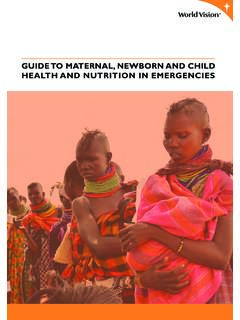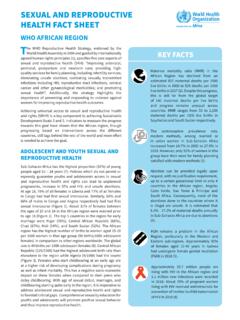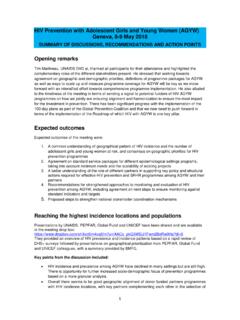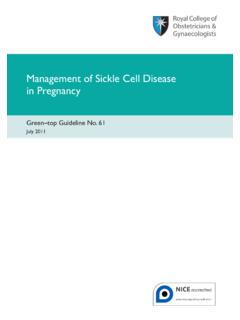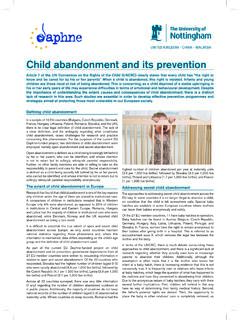Transcription of Direct Oral Anticoagulant (DOAC) counselling checklist
1 Approved: September 2018 Review date: July 2021 1 This patient has been counselled on the following areas of DOAC therapy by a member of the healthcare team counselling points (refer also to additional information overleaf) Sign Comment 1. What is anticoagulation and how does it work 2. Indication for DOAC 3. Alternative anticoagulation options 4. Advantages and disadvantages of DOAC compared to warfarin 5. Expected duration of therapy (check with referrer if unclear) 6. How to take: including dose, frequency, timing (aim to take at the same times every day) Rivaroxaban MUST be taken with food to maximise absorption Apixaban and edoxaban can be taken with/without food.
2 Dabigatran: take with food to minimise indigestion; capsules must NOT be opened or chewed and must NOT be removed from original packaging ( do not transfer to dosette box) 7. Importance of adherence and persistence with treatment: Fairly rapid fall in drug levels (and therefore loss of effectiveness) if poorly compliant Ways of remembering to take the tablets/capsules calendar Important not to stop treatment unless discussed with doctor 8. What to do if a dose is missed - If unsure, talk to healthcare provider If a dose is missed take it as soon as possible.
3 Do not take a double dose* (but see below for rivaroxaban and acute VTE) Once daily dosing: take within12 hours of missed dose, if more than 12 hours, omit the dose and then continue at the usual time. Twice daily dosing: take within 6 hours of missed dose, if more than 6 hours, omit the dose and then continue at the usual time. NOTE: *rivaroxaban 15mg twice daily (acute VTE): take one tablet as soon as remembered. Do not take more than two 15mg tabs in a single day (but can take 2x15mg at the same time to make a total of 30mg on one day).
4 Continue with 15mg twice daily the following day 9. Extra dose taken accidentally? Contact doctor or healthcare team 10. Side effects and what to do if experienced Signs/symptoms of excess anticoagulation (see overleaf) When to seek urgent medical attention 11. Monitoring ( renal function), how often and by who (see overleaf) 12. Potential for drug interactions: avoid over the counter medicines containing aspirin ( flu remedies), NSAIDs ( ibuprofen, naproxen, diclofenac) or herbals. Paracetamol is the preferred analgesic.
5 Pt to inform healthcare professional of any new meds. (NB: HCP must discuss any additional antiplatelet agent with referrer & haematologist as significantly risk of major bleeding with concurrent use) 13. Alcohol intake 14. Importance of reliable contraception in women of childbearing age and need to seek urgent medical advice in case of unexpected pregnancy (DOACs cross placenta). Do not breastfeed. 15. Procedures (inc. day surgery /dental or chiropractic treatments etc); hospital admissions 16. Leisure activities; avoid contact sports ( football, rugby, boxing) and other higher risk sports ( skiing and horse riding), as increased risk of head injury/falls/bruising/bleeding 17.
6 Injections (including immunisation): to inform relevant healthcare provider 18. How to obtain further supplies 19. Who to contact for advice/ further information 20. Supply appropriate company DOAC patient information booklet Supply completed DOAC alert card patient to carry at all times 21. Recheck patient s understanding of the above points Counselled by: (Sign & print name): ..Designation:..Date: .. Patient s signature: ..Date: .. Hospital Number: NHS Number: Patient Name: Date of Birth: Direct Oral Anticoagulant (DOAC) counselling checklist (apixaban, dabigatran, edoxaban, rivaroxaban) Approved: September 2018 Review date: July 2021 2 DOAC - additional counselling information (apixaban, dabigatran, edoxaban, rivaroxaban) 2.
7 Indication for treatment doses: Prevention of stroke and systemic embolism in adult patients with non-valvular AF (NVAF*) with additional risk factor(s); treatment of DVT /PE in adults and prevention of recurrent VTE. *NVAF - considered to be AF in the absence of a mechanical valve replacement or moderate to severe mitral stenosis usually of rheumatic origin; Ref Heidelbuch et al. Eurospace 2015 3. Alternative anticoagulants: eg. warfarin/acenocoumarol,low molecular weight heparin ( dalteparin), other DOACs 4. Advantages (vs. warfarin): fixed dose, INR monitoring not required, more stable anticoagulation control if taken reliably, favourable major bleeding profile overall, lower incidence of intracranial haemorrhage, less drug/diet interactions, easier to manage around surgery/procedures Disadvantages (vs.)
8 Warfarin):not appropriate for all pts ( extremes of body weight, renal impairment), some monitoring still required (eg renal function) although less frequent compared to INR monitoring,higher incidence of GI side-effects (dabigatran, rivaroxaban), no specific drug antidote (except dabigatran; others under development), limited long-term data 10. Side effects (and what to do if experienced) Seek medical attention: Bloody /black tarry stools, coughing/vomiting up blood, bloody urine, nose bleeds (lasting for > 5-10mins or if pt does not usually suffer from nose bleeds), severe or spontaneous bruising, unusual headaches, excessive vaginal bleeding, cuts that take longer than 5 minutes to stop bleeding, blood shot eye.
9 Seek immediate medical attention: involved in major trauma, significant blow to the head or are unable to stop bleeding GP/anticoagulation clinic: any other side-effects gastrointestinal (higher risk of GI bleeding with dabigatran 150 mg, rivaroxaban or edoxaban 60 mg vs warfarin) 11. Monitoring: dose will need to be reduced / stopped if renal function deteriorates. Frequency of monitoring usually depends on the level of renal function (but also other parameters); may vary from minimum 3monthly (more frequently if potentially brittle renal function) to 6-12monthly.
10 Also, FBC (when renal function checked) and LFTs (minimum annually). 12. Potential for drug interactions: may be affected by some medicines / herbal preparations (see SPC for relevant DOAC): Always let doctor/dentist/pharmacist know that s/he is on anticoagulation Avoid over the counter medications containing aspirin ( cough &cold remedies) and NSAIDs such as ibuprofen, aspirin, naproxen, diclofenac etc. Paracetamol is preferred. Avoid herbal medications (unknown interactions) NB: any proposed/concurrent prescription of an antiplatelet MUST be discussed with referrer and haematologist; if aspirin or clopidogrel are unavoidable, consider using DOAC with lowest GI bleeding risk and add PPI cover.









